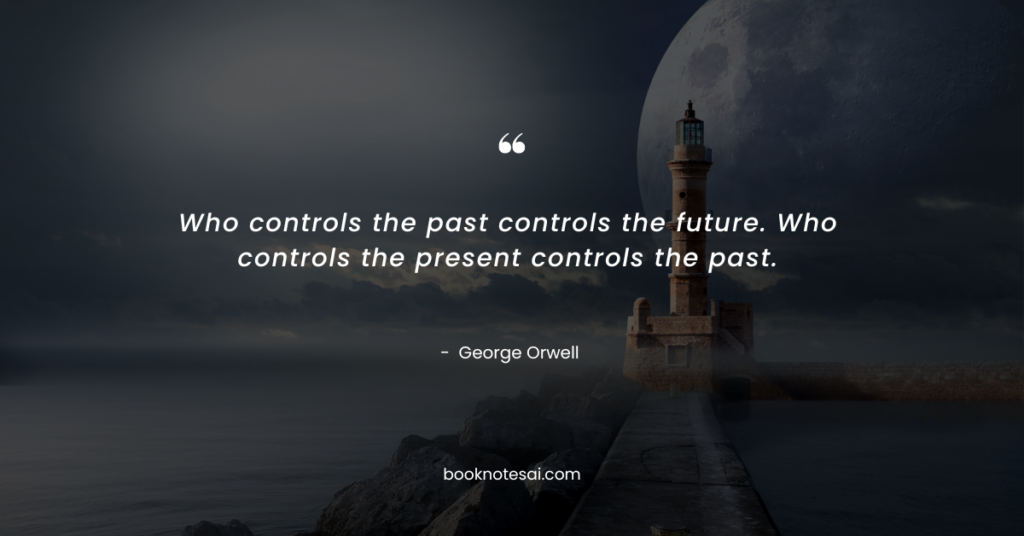Listen To This Post
1984 Summary: A Dystopian Classic.
A man trapped under the gaze of an authoritarian state feels more relevant now than ever before.

This is a book summary for 1984 by George Orwell. The essential information is structured to be straightforward, useful, and valuable, all while helping you save plenty of time.
Introduction: Why this book?
- George Orwell’s 1984 remains a seminal work in literature, offering a chilling portrayal of a dystopian society.
- Through its exploration of surveillance, propaganda, and totalitarianism, 1984 serves as a cautionary tale about the dangers of unchecked power.
1984 Summary:
- In 1984, George Orwell presents a bleak vision of a totalitarian regime ruled by the Party led by Big Brother.
- The protagonist, Winston Smith, rebels against the oppressive regime but ultimately succumbs to its control.
- The novel delves into themes of censorship, thought control, and the manipulation of truth.
- Orwell’s stark portrayal of a surveillance state serves as a warning against the erosion of individual freedoms.
- 1984 underscores the importance of critical thinking and the preservation of truth in the face of authoritarianism.
💡 5 Big Ideas
- The Perils of Totalitarianism: Orwell vividly illustrates the dangers of absolute power and the manipulation of truth to maintain control.
We learn the importance of safeguarding individual freedoms and resisting oppression. - Surveillance and Privacy: Through the omnipresent surveillance in Oceania, Orwell highlights the erosion of privacy and the chilling effects of constant scrutiny.
This reminds us of the value of privacy and the need to protect it. - Manipulation of Language: Orwell introduces Newspeak as a tool for thought control, emphasizing the power of language in shaping thought.
This underscores the significance of linguistic freedom and the dangers of linguistic manipulation. - Historical Revisionism: The Party constantly revises history to suit its narrative, demonstrating the malleability of truth under totalitarian regimes.
This underscores the importance of historical accuracy and the dangers of historical revisionism. - The Fragility of Individuality: Winston’s struggle against conformity and his desire for individual expression resonate with readers, highlighting the innate human yearning for autonomy.
This reminds us of the importance of individual identity in the face of conformity.
In summary, 1984 warns us about the perils of totalitarianism, the erosion of privacy, the manipulation of language, historical revisionism, and the fragility of individuality.
These insights urge us to safeguard our freedoms, resist oppression, protect privacy, preserve linguistic freedom, uphold historical accuracy, and celebrate individual identity.
Powerful Quotes
- “Big Brother is Watching You.” This quote emphasizes the pervasive surveillance and control exerted by the Party.
- “War is peace. Freedom is slavery. Ignorance is strength.” This quote highlights the Party’s manipulation of language to control thought.
- “Who controls the past controls the future. Who controls the present controls the past.” This quote underscores the Party’s manipulation of history.
- “Doublethink means the power of holding two contradictory beliefs in one’s mind simultaneously, and accepting both of them.” This quote reveals the cognitive dissonance enforced by the Party.
- “Freedom is the freedom to say that two plus two make four. If that is granted, all else follows.” This quote emphasizes the importance of truth and intellectual freedom.
- “Until they become conscious they will never rebel, and until after they have rebelled they cannot become conscious.” This quote reflects on the process of awakening to oppression.
- “The choice for mankind lies between freedom and happiness and for the great bulk of mankind, happiness is better.” This quote explores the trade-offs between freedom and comfort.
- “Orthodoxy means not thinking—not needing to think. Orthodoxy is unconsciousness.” This quote reflects on the dangers of unquestioning obedience.
- “If you want to keep a secret, you must also hide it from yourself.” This quote delves into the nature of self-deception.
- “Reality exists in the human mind, and nowhere else.” This quote challenges the notion of objective reality.
One Reason To Read This Book:
Discover the timeless relevance of Orwell’s warnings about the dangers of authoritarianism and the erosion of truth.
Who should I recommend 1984 Summary to?
If you’re interested in exploring themes of surveillance, censorship, and the consequences of totalitarianism, 1984 is a must-read.
Whether you’re a student of history, politics, or literature, this book offers profound insights into the human condition and the nature of power.
Recommendations:
- “Brave New World” by Aldous Huxley
- “Animal Farm” by George Orwell
- Podcast: “The Orwell Tapes” by BBC Radio 4
- Article: “The Relevance of 1984 in Today’s Society” by The Atlantic
This summary serves as a complimentary guide to the reviewed title 1984, offering key insights. For a deeper understanding, we encourage you to explore the full book.


